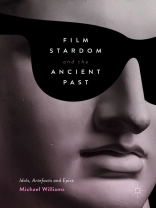This book offers the first comprehensive exploration of how the ancient past has shaped screen stardom in Hollywood since the silent era. It engages with debates on historical reception, gender and sexuality, nostalgia, authenticity and the uses of the past. Michael Williams gives fresh insights into ‘divinized stardom’, a highly influential and yet understudied phenomenon that predates Hollywood and continues into the digital age.
Case studies include Greta Garbo and
Mata Hari (1931); Buster Crabbe and the 1930s Olympian body; the marketing of Rita Hayworth as Venus in the 1940s; sculpture and star performance in Oliver Stone’s
Alexander (2004); landscape and sexuality in
Troy (2004); digital afterimages of stars such as Marilyn Monroe; and the classical body in the contemporary ancient epic genre. The author’s richly layered ‘archaeological’ approach uses detailed textual analysis and archival research to survey the use of themyth and iconography of ancient Greece and Rome in some of stardom’s most popular and fascinating incarnations.
This interdisciplinary study will be significant for anyone interested in star studies, film and cultural history, and classical reception.
Cuprins
1. Introduction: An Archaeology of Stardom.- 2.
Section One: Oracles and Olympians - ‘Above Everything?’:
Idols and Idolatry in Mata Hari (1931).- 3. ‘The American Adonis’: The Hollywood Olympian Body.- 4.
Section Two: Down to Earth: Rebuilding the Hollywood Pantheon - ‘A Dream of a Theme’:
Down to Earth (1947), Rita Hayworth and Marketing the Post-war Goddess.- 5. Idols, Fragments and Reconstructions.- 6.
Section Three: Heroes Will Rise: Patinated Pasts and Digital Futures - Patinating the Past: Stars, Artefacts and
Alexander (2004).- 7. ‘Remember Me’: Memory and Landscape in
Troy (Wolfgang Petersen, 2004).- 8. Titans, Immortals and Broken Idols: Classicism in the Digital Age.
Despre autor
Michael Williams is Associate Professor in Film at the University of Southampton, UK. He is the author of Film Stardom, Myth and Classicism (Palgrave Macmillan, 2013), Ivor Novello (BFI, 2003), and co-editor of British Silent Cinema and the Great War (Palgrave Macmillan, 2011).












